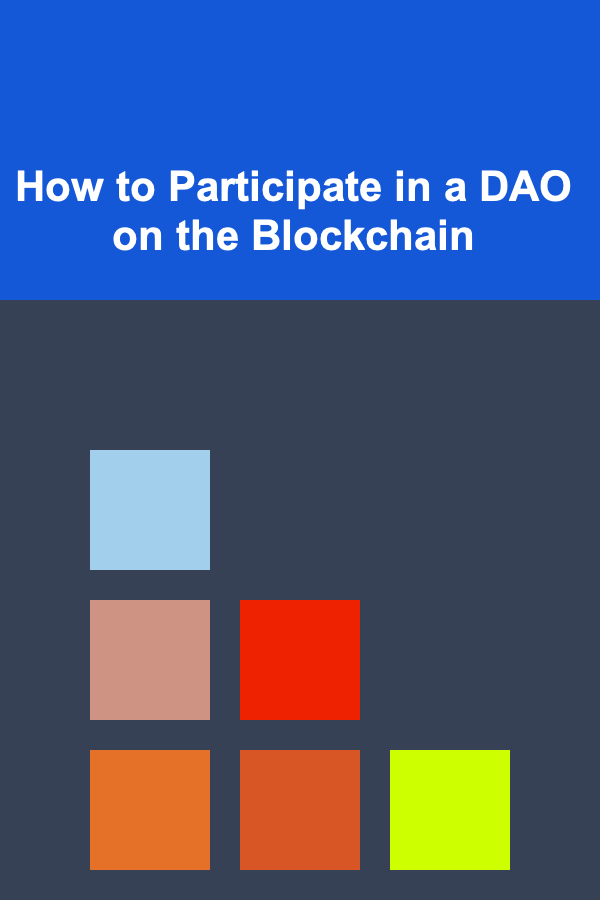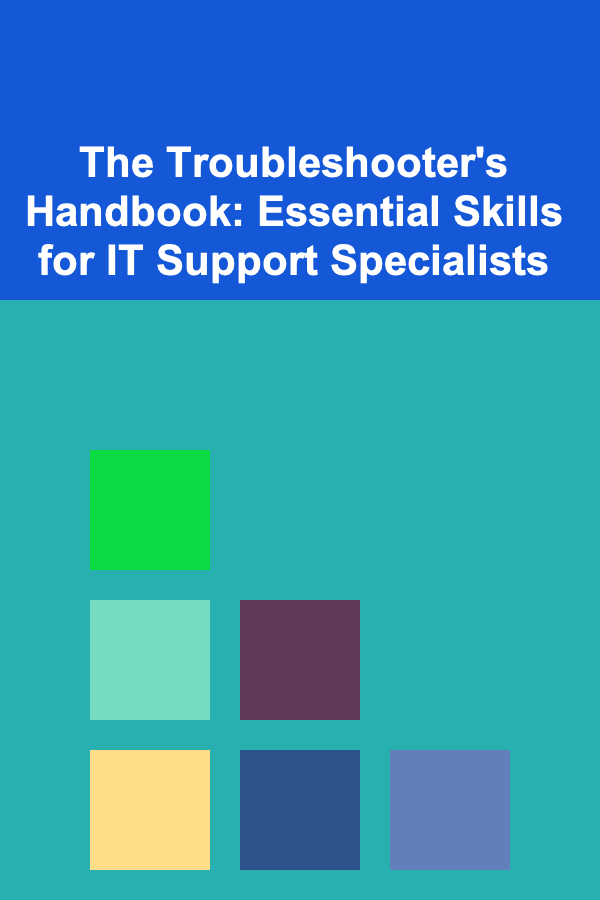
How to Participate in a DAO on the Blockchain
ebook include PDF & Audio bundle (Micro Guide)
$12.99$8.99
Limited Time Offer! Order within the next:

In recent years, the rise of decentralized technologies has reshaped many industries, and one of the most exciting innovations is the decentralized autonomous organization (DAO). DAOs are transforming how organizations are managed, creating a new kind of governance that is transparent, democratic, and driven by blockchain technology. These organizations rely on smart contracts and decentralized protocols to operate, removing traditional hierarchies and giving decision-making power to the community members.
Participating in a DAO on the blockchain is a unique and empowering way to engage in decision-making and contribute to projects you believe in. However, navigating the world of DAOs can be complex, especially for newcomers. This article will provide an in-depth guide on how to participate in a DAO, from understanding its core principles to interacting with its governance mechanisms. By the end, you will have a clearer idea of how you can engage in the decentralized future.
What is a DAO?
Decentralized Autonomous Organization: A New Governance Model
A DAO is an organization that operates autonomously through smart contracts and blockchain technology. Unlike traditional organizations, which are typically governed by boards, executives, and managers, DAOs are decentralized and managed collectively by their members. These organizations are often run without any central leadership or traditional hierarchy. Instead, decision-making authority is distributed among all stakeholders, who vote on key proposals using tokens, typically through a blockchain-based governance system.
DAOs are designed to be transparent, secure, and immutable, offering anyone the ability to join, participate, and contribute to decision-making processes. The blockchain ensures that all actions and proposals are recorded transparently, and smart contracts automatically execute decisions when certain conditions are met.
The main objectives of a DAO are to provide decentralized governance, create trustless interactions, and allow people from around the world to collaborate and manage a shared ecosystem. This model of governance offers a number of advantages, including increased transparency, greater accountability, and enhanced security.
Key Features of a DAO
To understand how to participate in a DAO, it's essential to first explore the core features that define these organizations.
- Decentralization: DAOs are not controlled by any single entity. Instead, they operate through a decentralized network of participants who collectively make decisions. This ensures that power is distributed among the community rather than being concentrated in the hands of a few.
- Token-Based Voting: Most DAOs use tokens for voting on proposals. These tokens are typically earned or purchased and represent ownership or influence within the DAO. The more tokens a participant holds, the greater their influence on governance decisions.
- Smart Contracts: Smart contracts are self-executing contracts with the terms of the agreement directly written into code. In DAOs, smart contracts automate the governance process by executing decisions based on the outcome of votes.
- Transparency: All activities within a DAO are recorded on a public blockchain, making them transparent and immutable. This allows members to verify actions, view past proposals, and ensure that the system operates fairly.
- Autonomy: DAOs function without the need for intermediaries. The use of smart contracts ensures that decisions are made according to predefined rules, with minimal human intervention.
Why Participate in a DAO?
A New Kind of Governance
Participating in a DAO offers individuals a unique opportunity to be part of a new kind of governance. DAOs eliminate traditional power structures, allowing every member to have a say in the direction of the organization. Unlike centralized organizations where a small group of individuals holds decision-making power, DAOs give everyone the chance to vote on proposals and shape the future of the project.
DAOs also promote a meritocratic system where contributions are rewarded. Since DAOs are typically built on blockchain platforms, individuals can participate from anywhere in the world, contributing their expertise, skills, and resources in a decentralized manner. The open and inclusive nature of DAOs encourages a diverse range of voices and ideas, ultimately leading to more innovative and well-rounded solutions.
Influence Over Decisions
One of the primary reasons people participate in DAOs is to influence decisions that directly impact the projects they care about. Whether it's a decentralized finance (DeFi) project, a decentralized application (dApp), or a social impact initiative, DAOs allow participants to contribute to governance and decide on important issues, such as the allocation of funds, protocol upgrades, and project direction.
Rewards for Participation
Another reason to participate in a DAO is the potential for rewards. Many DAOs distribute governance tokens as incentives for members who contribute to the community or participate in the decision-making process. These tokens can appreciate in value over time, providing financial benefits for active members. Additionally, some DAOs offer revenue-sharing models, where participants can earn a share of profits generated by the organization.
How to Get Started with a DAO
Step 1: Understand the DAO's Purpose and Governance Model
Before you can participate in a DAO, it's crucial to understand its purpose and governance model. Each DAO operates with different objectives, ranging from decentralized finance (DeFi) platforms, to NFT marketplaces, to social impact projects. Research the DAO's mission and goals to ensure they align with your interests and values.
Additionally, familiarize yourself with the DAO's governance model. Some DAOs use a one-token-one-vote system, while others may employ more complex mechanisms such as quadratic voting or delegated voting. Understanding the voting process is key to knowing how your participation will impact decision-making.
Step 2: Acquire the Necessary Tokens
Most DAOs require participants to hold tokens in order to vote on proposals and participate in governance. These tokens can be purchased on cryptocurrency exchanges or earned through contributions. Tokens may also be distributed as rewards for early supporters or active participants in the DAO's ecosystem.
To acquire tokens, follow these general steps:
- Create a Cryptocurrency Wallet: DAOs operate on blockchain networks, so you'll need a digital wallet to store your tokens. Popular wallets include MetaMask, Trust Wallet, and Coinbase Wallet. Choose a wallet that supports the blockchain network used by the DAO (e.g., Ethereum, Binance Smart Chain, etc.).
- Purchase Tokens: Once your wallet is set up, you can purchase the necessary tokens on exchanges such as Uniswap, Sushiswap, or centralized exchanges like Binance or Coinbase.
- Transfer Tokens to Your Wallet: After purchasing tokens, transfer them to your personal wallet to ensure you have control over them.
Step 3: Join the DAO Community
To get involved in a DAO, it's important to become an active part of the community. Most DAOs have online forums, Discord servers, Telegram groups, or social media channels where members can discuss proposals, share ideas, and collaborate on projects. These community channels are essential for staying informed about the DAO's activities and participating in discussions.
Joining the DAO's community allows you to understand the organization's culture, engage with other members, and contribute to its development. Community involvement is also a great way to build relationships with like-minded individuals and stay up to date on upcoming votes and proposals.
Step 4: Participate in Governance and Voting
Once you've acquired tokens and joined the community, you can start participating in the DAO's governance process. The voting process may vary from one DAO to another, but generally, you'll use your tokens to vote on various proposals. These proposals may include decisions on funding allocations, protocol upgrades, partnerships, or other organizational matters.
Here's how you can participate:
- Stay Informed: DAOs typically announce upcoming proposals and votes through their communication channels. Stay active in the community to ensure you're aware of important decisions.
- Review Proposals: When a proposal is put forward, carefully review the details to understand its implications. DAOs often provide detailed documents and discussions surrounding each proposal to help members make informed decisions.
- Vote on Proposals: After reviewing the proposal, use your tokens to cast your vote. Depending on the DAO's governance model, your vote may carry more or less weight based on the number of tokens you hold. Some DAOs also allow for delegation, where you can delegate your voting power to another trusted member.
- Contribute to Discussions: In addition to voting, you can participate in discussions surrounding proposals. Many DAOs encourage community feedback, allowing members to voice their opinions before a proposal is finalized.
Step 5: Contribute to the DAO
Beyond voting, many DAOs encourage members to contribute to the project in other ways. Contributions may include developing software, creating content, managing finances, marketing the project, or helping with governance tasks.
Some DAOs offer bounties or rewards for specific tasks, providing members with incentives to contribute their skills. If you're passionate about the DAO's mission and want to take a more active role, look for opportunities to contribute and engage with the community.
Step 6: Stay Engaged and Evolve
DAOs are constantly evolving, and it's important to stay engaged with the community as the organization grows. New proposals, projects, and governance mechanisms will continue to emerge, and your involvement can help shape the direction of the DAO.
Being an active member will not only ensure you remain informed, but it also gives you the opportunity to influence the DAO's future decisions. The decentralized nature of DAOs allows for continuous feedback, and your participation helps build a more dynamic and inclusive ecosystem.
Conclusion
Participating in a DAO is an exciting way to engage with decentralized governance and contribute to projects that matter to you. By understanding the DAO's purpose, acquiring tokens, joining the community, and actively participating in governance, you can have a real impact on the organization and its direction. DAOs represent a new frontier of organizational management, and with blockchain technology, the possibilities for decentralized collaboration are limitless.
Whether you're interested in decentralized finance, social impact, or simply exploring a new way of governance, DAOs offer a unique opportunity to participate in the future of decentralized communities.

How to Choose the Best Closet System for Your Space
Read More
How to Light Your Home with a Minimalist Approach
Read More
How to Plan for Financial Independence and Early Retirement
Read More
How to Plan for Retirement While Budgeting
Read More
PR Specialist's Handbook: Best Practices for Crisis Management and Media Relations
Read More
The Troubleshooter's Handbook: Essential Skills for IT Support Specialists
Read MoreOther Products

How to Choose the Best Closet System for Your Space
Read More
How to Light Your Home with a Minimalist Approach
Read More
How to Plan for Financial Independence and Early Retirement
Read More
How to Plan for Retirement While Budgeting
Read More
PR Specialist's Handbook: Best Practices for Crisis Management and Media Relations
Read More